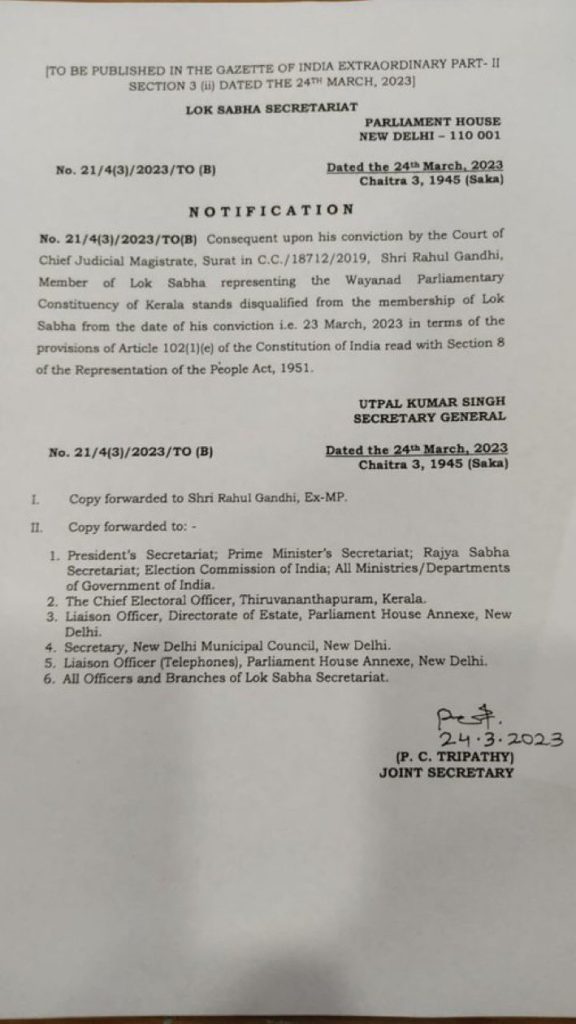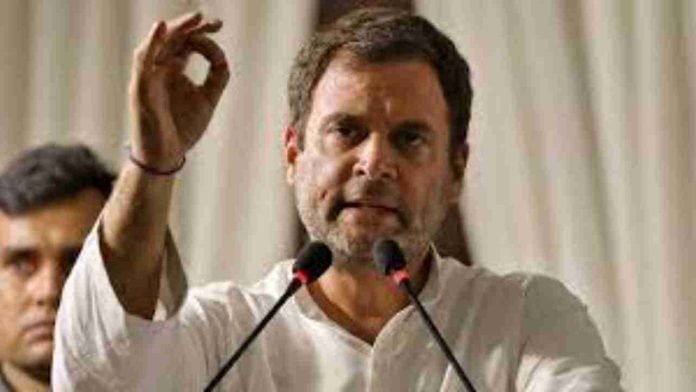Congress leader Rahul Gandhi was disqualified from the membership of the Lok Sabha on Friday, following his conviction in a defamation case of 2019.
A notification issued by the Lok Sabha Secretariat said that consequent to his conviction by the Court of Chief Judicial Magistrate, Surat in a 2019 case, Member of Lok Sabha representing the Wayanad Parliamentary Constituency of Kerala, Rahul Gandhi, stood disqualified from the membership of Lok Sabha from the date of his conviction, which was March 23, 2023 in terms of the provisions of Article 102(1)(e) of the Constitution read with Section 8 of the Representation of the People Act, 1951.
As per the 1951 Act, a person will be disqualified if convicted and sentenced to imprisonment for two years or more and shall continue to be disqualified for a further period of six years after his release.
Earlier on Thursday, the Court of Chief Judicial Magistrate H.H. Varma convicted Gandhi in a defamation case for his alleged remarks against Prime Minister Narendra Modi in April 2019.
After finding him guilty under Sections 499 (defamation) and 500 (punishment for defamation) of Indian Penal Code (IPC), the court sentenced Gandhi to two years in jail and also imposed a fine of Rs 15,000 on him.
Gandhi secured bail in the case on a bail bond of Rs 10,000. The court granted him a month’s time to file an appeal against the order.
Gandhi’s conviction under Sections 499 and 500 of the Indian Penal Code (IPC), both of which warrant a maximum sentence of two years, led to his disqualification from the Parliament, as per a Supreme Court order of 2013.
On July 10, 2013, the Supreme Court had ruled had that any MP, MLA, or MLC convicted for a crime and given a minimum two years’ imprisonment would lose membership of the House with immediate effect.
The SC Bench of Justice A. K. Patnaik and Justice S. J. Mukhopadhaya had further declared as unconstitutional Section 8 (4) of the Representation of the People Act, which granted elected representatives three months to challenge their conviction.
During a rally at Kolar in Karnataka ahead of the 2019 Lok Sabha elections, Rahul had allegedly said, “Nirav Modi, Lalit Modi, Narendra Modi. How come all the thieves have Modi as the common surname?”
BJP MLA and former Gujarat minister Purnesh Ishvarbhai Modi had filed a defamation suit against Gandhi in Surat, alleging the remark had defamed the entire Modi community. On the basis of his complaint, a case was registered against Gandhi at Adajan Police Station in Surat district.
Advocate K.C. Panwala appeared for Gandhi, while Purnesh Modi was represented by K.P. Reshamwala.
The Gujarat High Court recently vacated the stay on trial in the case pursuant to which the trial resumed.
Section 8 (3) in The Representation of the People Act, 1951 says: (3) A person convicted of any offence and sentenced to imprisonment for not less than two years [other than any offence referred to in sub-section (1) or sub-section (2)] shall be disqualified from the date of such conviction and shall continue to be disqualified for a further period of six years since his release.] 9[(4)] Notwithstanding anything 10[in sub-section (1), sub-section (2) or sub-section (3)] a disqualification under either sub-section shall not, in the case of a person who on the date of the conviction is a member of Parliament or the Legislature of a State, take effect until three months have elapsed from that date or, if within that period an appeal or application for revision is brought in respect of the conviction or the sentence, until that appeal or application is disposed of by the court.
Read the Lok Sabha notification here:



